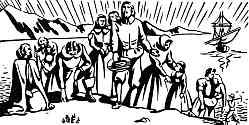|
A Radio Talk by Charles F. Kettering As the years have gone by, our knowledge of the Pilgrims and their early trials may be only the recollection of a chapter in an old history book. So on the eve of this Thanksgiving Day, let us take a look at the life of those hardy ancestors of ours - perhaps it may show us something interesting and helpful.  The trials and tribulations of the Pilgrims after they landed on Plymouth Rock in 1620 of course are very well known in New England - during that first bitter winter they suffered from cold and disease. But unlike the settlers in some of the other colonies, they had already conquered one thing despair. This spiritual enemy had been defeated long before they came here as the result of religious persecution in the Old World. England in the early 17th century had undergone a church reform and the Puritans and others had been forced to leave England and go to Holland. But this was not the solution to their religious problem, so when they heard of the colonies in the New World, they formed a company to finance an expedition to this new land, and while they faced terrible physical hardships, they found here something they had never known before - real religious freedom - so despair was gone. |








